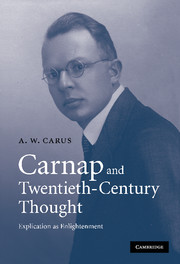Book contents
- Frontmatter
- Contents
- Preface
- Note on the style of citation
- Introduction
- 1 The cultural inheritance
- 2 The intellectual inheritance: positivism and Kantianism
- 3 The grand plan of a ‘system of knowledge’: science and logic
- 4 Carnap's early neo-Kantianism
- 5 The impact of Russell
- 6 Rational reconstruction
- 7 The impact of Wittgenstein
- 8 The crisis of rational reconstruction, 1929–1930
- 9 Liberation
- 10 Tolerance
- 11 The ideal of explication
- Bibliography
- Index
7 - The impact of Wittgenstein
Published online by Cambridge University Press: 22 September 2009
- Frontmatter
- Contents
- Preface
- Note on the style of citation
- Introduction
- 1 The cultural inheritance
- 2 The intellectual inheritance: positivism and Kantianism
- 3 The grand plan of a ‘system of knowledge’: science and logic
- 4 Carnap's early neo-Kantianism
- 5 The impact of Russell
- 6 Rational reconstruction
- 7 The impact of Wittgenstein
- 8 The crisis of rational reconstruction, 1929–1930
- 9 Liberation
- 10 Tolerance
- 11 The ideal of explication
- Bibliography
- Index
Summary
The programme of rational reconstruction set out in 1922–3 had given great prominence to a notion of ‘structure’ that remained somewhat enigmatic. And though ‘structure’ itself was purely logical or analytic, its application instance in the ‘constructive’ project of the Aufbau sought to capture the component of knowledge that Helmholtz and Poincaré had said was all we ultimately could know about the world: ‘What science can attain to is not the things themselves but only the relations among the things; apart from these relations there is no knowable reality’ (Poincaré 1904, p. XIII). Carnap, as we saw, had taken this further, and built his project of rational reconstruction on the idea that ‘every science is a science only insofar as the study of structures [Strukturlehre] is contained in it’ (above, p. 163). Did this make our knowledge of ‘structure’ itself a form of synthetic knowledge? And finally, even if ‘structure’ was purely logical, where did the principles of logic come from? All Carnap's great role models in logic had answered this last question by gesturing toward a special source of knowledge, different from the empirical – the principles of logic were synthetic a priori, or traceable to a ‘logical source of knowledge’ that gives us our ability to grasp ‘thoughts’ residing in a ‘third realm’ distinct from the first realm of physical objects and the second realm of subjective consciousness.
As we saw, Carnap came increasingly to eschew the idea of grounding knowledge on any sort of intuition.
- Type
- Chapter
- Information
- Carnap and Twentieth-Century ThoughtExplication as Enlightenment, pp. 185 - 207Publisher: Cambridge University PressPrint publication year: 2007

